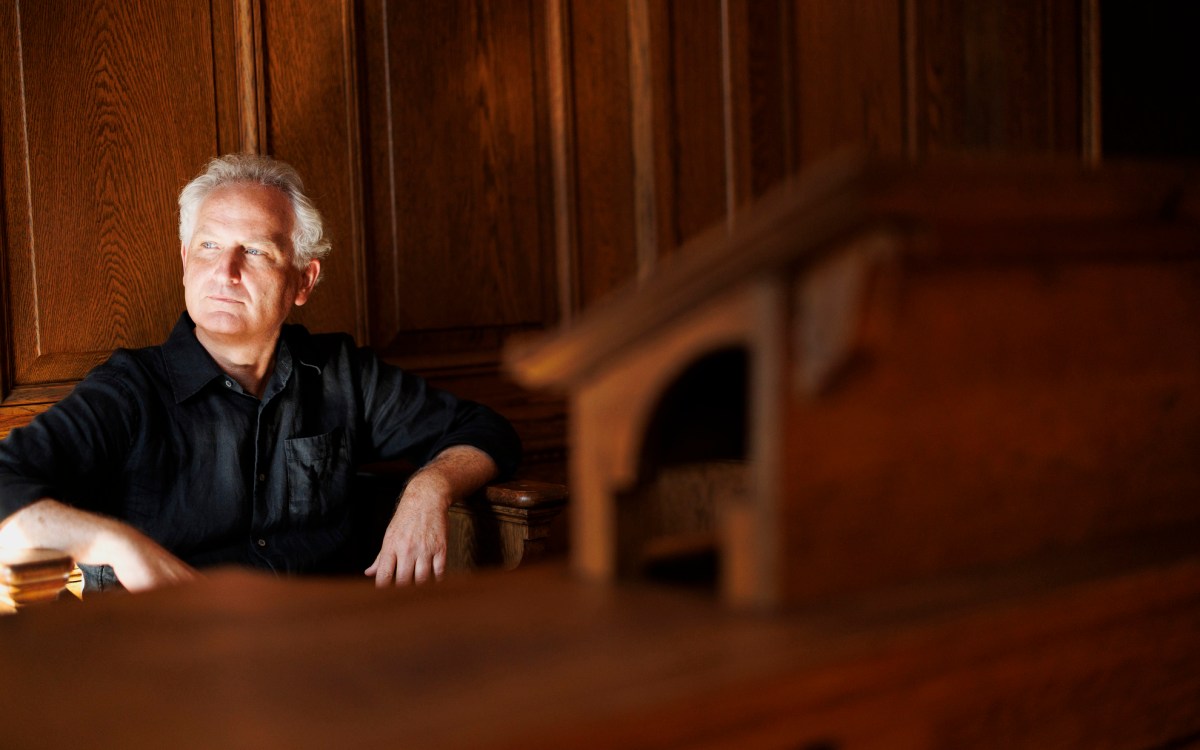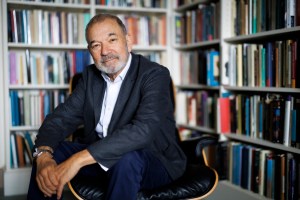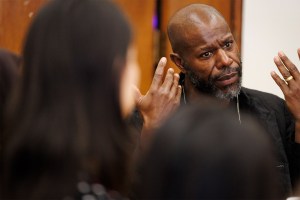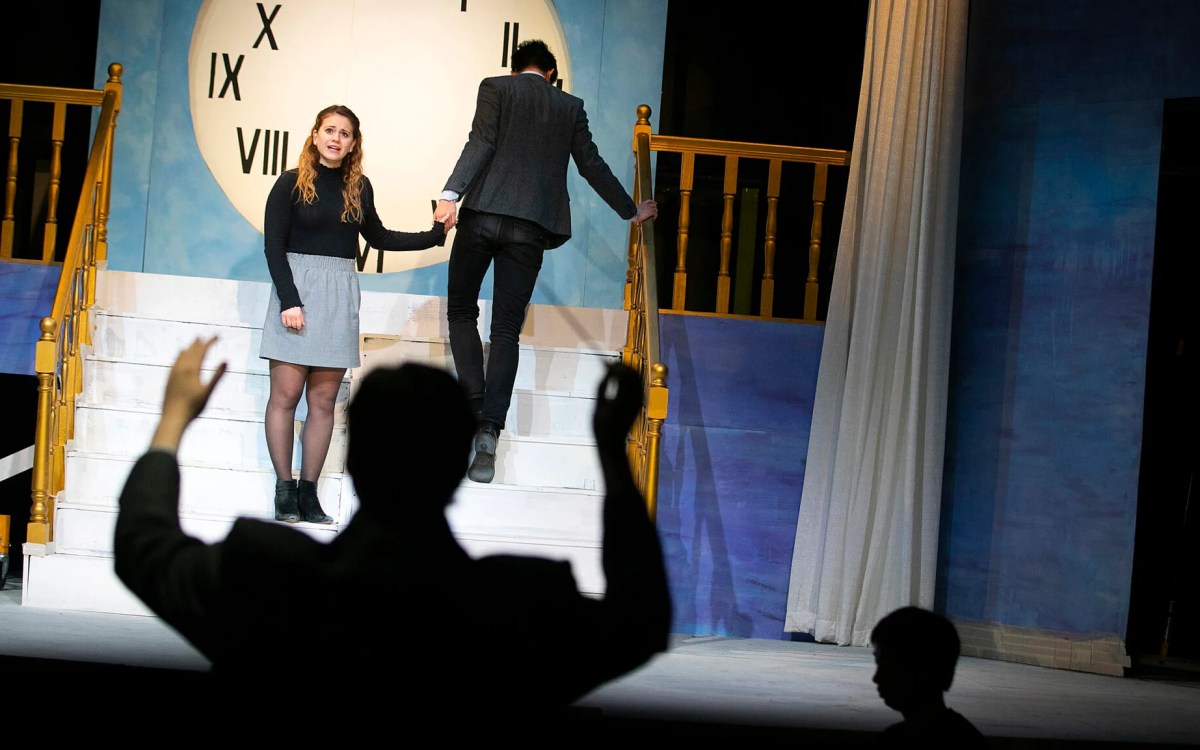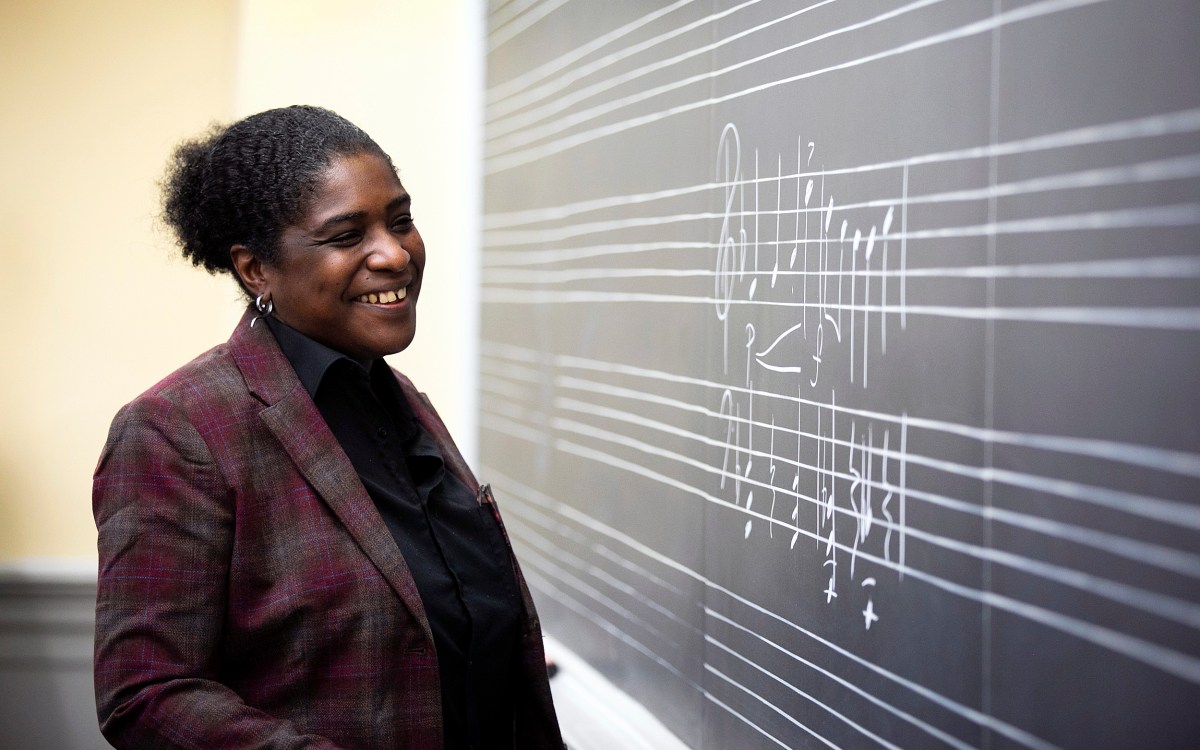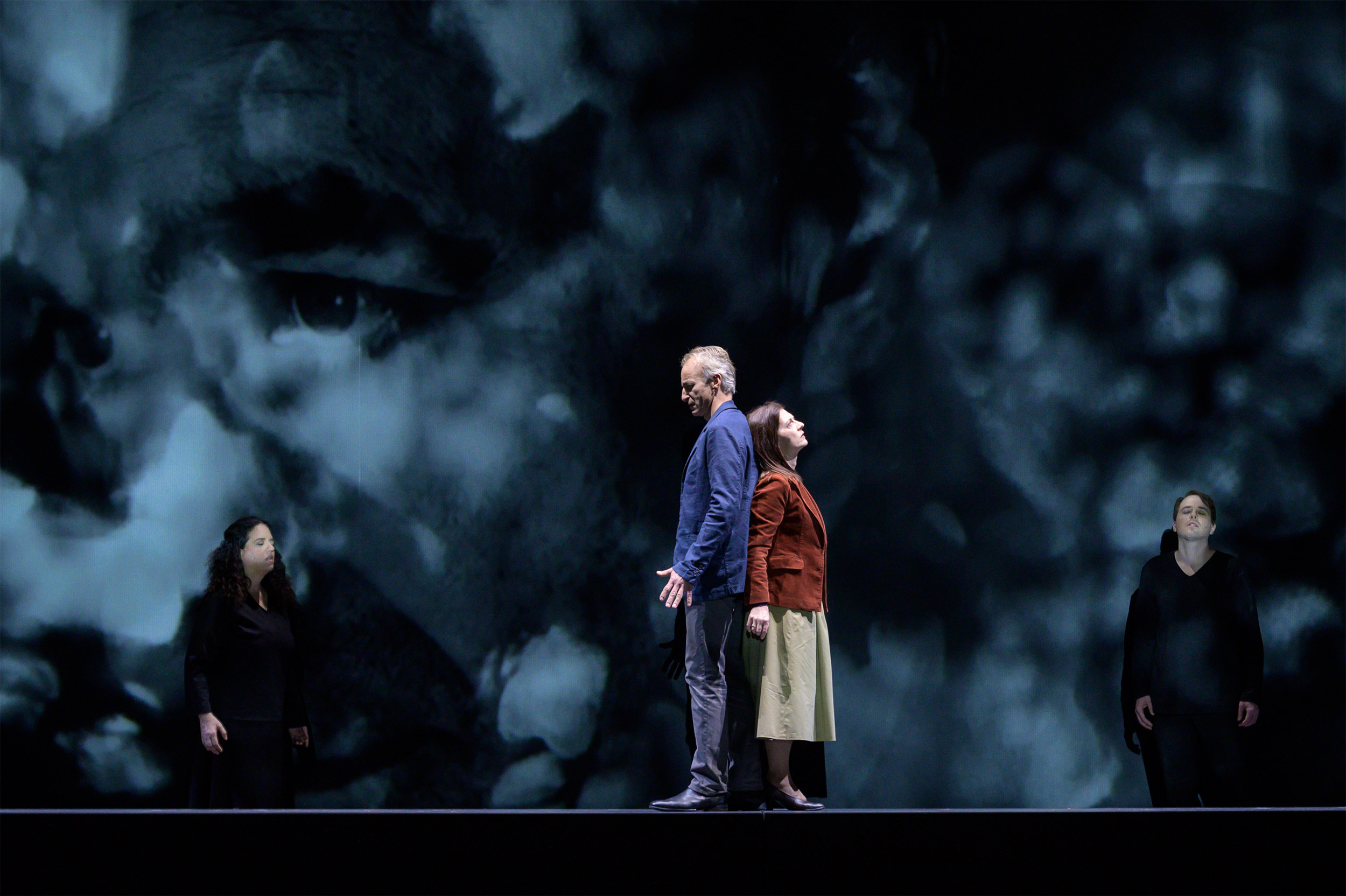
To capture that complicated emotional landscape composer Chaya Czernowin employs a pair of main characters in “Heart Chamber” — a man and a woman who fall in love — and two other singers who represent the duality of her protagonists’ inner thoughts.
Photo by Michael Trippel
Giving voice to the heart
New opera by Chaya Czernowin explores the inner workings and many voices of the heart and soul
Nature often serves as muse for Chaya Czernowin, but the composer turned to one of art’s most beguiling sources of inspiration for her new work, which just premiered at Deutsche Oper Berlin.
Czernowin’s opera, “Heart Chamber,” transforms one of the largest music theaters in Germany into an intimate space “where there is nobody else,” she said, and where the beauty, as well as the pain and uncertainty associated with falling in love grabs center stage. “I take this huge hall,” said Czernowin, Harvard’s Walter Bigelow Rosen Professor of Music Composition, “and it becomes the soul of somebody.”
But exactly how do you craft a piece of music around such a singularly personal experience and make it resonate with each member of an audience of 1,600? Czernowin’s solution is to incorporate all of the voices that simultaneously swirl through the mind of anyone who has ever had his or her heart filled, or broken, by love. To capture that complicated emotional landscape she employs just a pair of main characters in “Heart Chamber” — a man and a woman who fall in love — and two other singers who represent the duality of her protagonists’ inner thoughts.
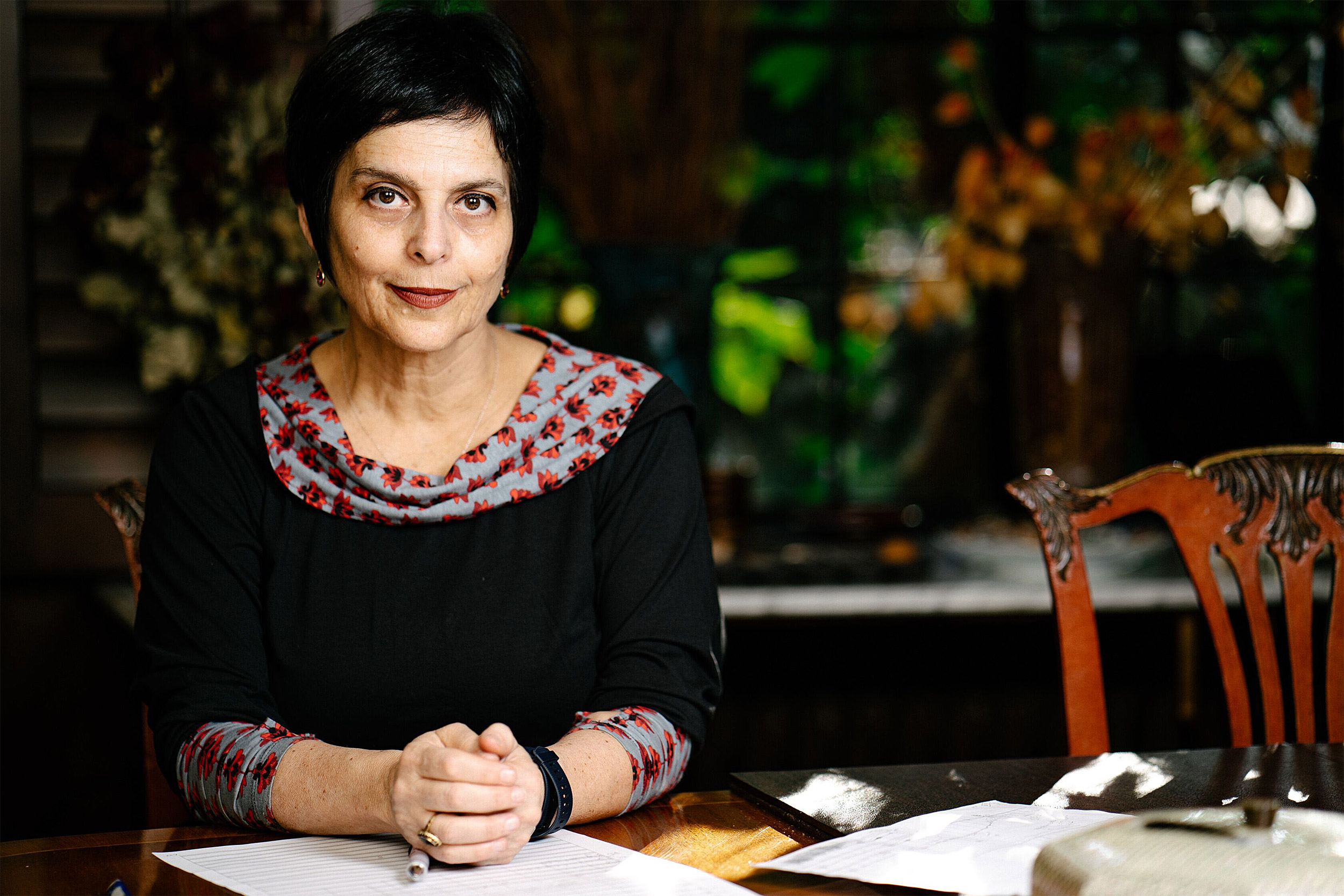
Reviewers have praised Chaya Czernowin’s opera, “Heart Chamber,” describing it as “overwhelming and touching in an unfamiliar way.” Czernowin is the Rieman and Baketel Fellow for Music at the Radcliffe Institute for Advanced Study.
Photo by Christopher McIntosh
The new production also includes a 16-person chorus that gives voice to the social forces that often weigh heavily on views of love and marriage. “The choir is actually part of what is happening in the soul of the protagonist,” said the Israeli-born composer, “because they are the voice of society which says: ‘Oh yes, we must create families, we must have children.’”
Currently on leave from her Harvard teaching duties while the Rieman and Baketel Fellow for Music at the Radcliffe Institute for Advanced Study, Czernowin said her work deals with the concepts of “identity, and fractured identity.”
“I never believed that a person speaks in one voice, and I never believed that one voice is the soloist. And so I’ve dealt with the fracturing but also the enlarging, or diving in, or zooming in on the psychological depths of someone and really showing the complexity of all the voices inside.”
For instrumentation, “Heart Chamber” blends an orchestral score with quirky acoustic elements periodically projected throughout the hall, such as the plinking of a comb as someone runs a finger over its teeth, or the clack of plastic hand clappers. The combination of familiar and unfamiliar sounds is designed to take the listener into a deeper “subconscious space,” she said. “There are things which are very intimately known to the ear, and there are things that are absolutely unknown, and the mixture is very strange.”
“Heart Chamber Closeup II”
Exploring the inner workings of the mind and the soul with her compositions is familiar ground for Czernowin. Her last opera, “Infinite Now,” similarly places the listener “inside of a head/heart/body,” notes its online description. Based on a play about World War I chaos and a Chinese story about a woman trapped in a house, the piece examines “how we continue to live even if we feel we don’t have control of our life,” she said. As she labored over that earlier score, the thought of capturing in music and song something as unsettling and complicated as falling in love was never far from her mind.
“Through that time and even before I had the idea of something, which is much more fragile, about the risk, not about the assurance, of our continued existence,” said Czernowin. “‘Infinite Now’ is about getting there. [With ‘Heart Chamber’] I wanted to do something that is much more fragile, much more vulnerable,” where the outcome is much less clear.
Listeners and critics have embraced her approach. A capacity crowd responded with a series of ovations at the final curtain on opening night — the first time in its history the Berlin opera house has sold out for the premiere of a contemporary piece. Reviewers have praised the production, with one calling it “overwhelming and touching in an unfamiliar way.” In an online post, Anne Shreffler, Harvard’s James Edward Ditson Professor of Music, wrote: “If Czernowin’s aim is to let us feel and sense what it’s like to be ‘under the skin’ of the protagonists, then her music also allows us access to our own inner emotional states, if we are ready to take it on.”
Leading her audiences into foreign musical territory is a driving force for Czernowin, who uses her compositions to push boundaries, ask questions, and challenge listeners to delve a little deeper into something unexpected. Still, she knows the topic of accessibility in contemporary music is unavoidable.
“From my point of view it is kind of sad because for a lot of people who write new music, which is more inquisitive or speculative, we are actually enabling a totally different avenue than the very accessible, chewable, use-and-throw away-thing that we all engage in 24/7.
“I am actually very proud if people tell me, ‘It took me four times of listening to your piece but then I actually got something that I didn’t experience before.’ For me, that continued curiosity is a compliment.”
During her Radcliffe fellowship Czernowin plans more experiments with form and using nature as a creative spark. She is currently working on a one-hour piece for chamber orchestra titled “The Fabrication of Light,” inspired by the sun that streams through the windows of her Newton home.
“I love the idea of light, and how light changes every place it touches, and what it means to have blinding light, or to have only very little light, or colored light that filters through leaves so that it is almost green,” said Czernowin. “All these forms of light and how they come out of each other or change in their environment inspire me.”
